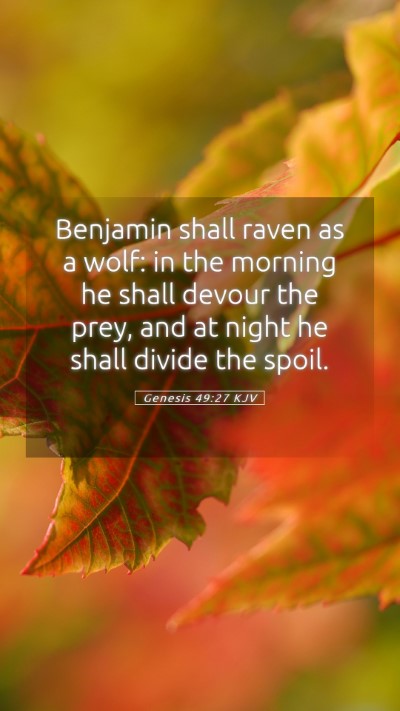Understanding Genesis 49:27
Bible Verse: Genesis 49:27 - "Benjamin is a ravenous wolf; in the morning he shall devour the prey, and at night he shall divide the spoil."
Overview of Genesis 49:27
This verse is part of Jacob's blessing for his twelve sons, where he speaks prophetically about the future characteristics and behaviors of each tribe. In this context, Benjamin, the youngest son, is described with fierce imagery that signifies strength and aggressiveness. This has been interpreted in various ways throughout biblical commentaries.
Bible Verse Meanings and Interpretations
- Ravenous Wolf: The metaphor of a "ravenous wolf" implies ferocity and a predatory nature. This description highlights Benjamin's tribe, suggesting they will be strong warriors and formidable in conflict.
- Morning and Night Imagery: The reference to morning and night signifies a relentless pursuit of victory, whether in the early phases of conflict or during times of rest when they may enjoy the spoils of their victories.
Biblical Exegesis and Commentary Insights
Commentaries from Matthew Henry, Albert Barnes, and Adam Clarke provide substantial insights into this verse:
-
Matthew Henry: Henry notes that Benjamin's characterization as a "wolf" reflects the fierce nature of his descendants, particularly in their military endeavors. He emphasizes that Benjamin’s strength would ultimately prevail, and this attribute would be significant in the battles faced by the tribes of Israel.
-
Albert Barnes: Barnes interprets this passage as a symbol of Benjamin’s boldness and valor in warfare. He points to the cohesive strength of the tribe in historical contexts, including their role in the battles depicted in the Book of Judges and the establishment of the first king of Israel, Saul, who belonged to the tribe of Benjamin.
-
Adam Clarke: Clarke suggests that the use of wolf imagery either signifies a strong warrior tribe or indicates the potential for internecine conflict. He discusses how this duality could also be seen as Benjamin striving for prosperity both through warfare and the subsequent division of spoils, indicating resourcefulness and ambition.
Application and Relevance in Daily Life
This verse can serve as a reminder of the dual nature of strength and aggression in achieving one's goals. Within Bible study groups, it encourages discussions on the balance between pursuing ambitions and maintaining ethical practices. The imagery can also reflect societal behaviors where the competitive spirit can drive success but at potential cost to moral and communal relationships.
Cross References
- Deuteronomy 33:12 - Discusses the tribe of Benjamin as beloved by the Lord and protected.
- Judges 3:15 - Acknowledges the bravery and heroism from the tribe of Benjamin.
- 1 Samuel 9:21 - The first king of Israel, Saul, from the tribe of Benjamin, depicts their influence.
In-Depth Bible Verse Analysis
Understanding the complexities of Genesis 49:27 requires examining the historical context surrounding the tribe of Benjamin, including its formation, battles, and eventual legacy within the larger narrative of Israel. As you study this verse, consider the implications of genetic traits and behaviors attributed to the descendants of Benjamin and their relevance today.
Conclusion
This exploration of Genesis 49:27 enhances our comprehension of biblical themes regarding strength, resourcefulness, and the consequences of conflict. As you engage in Bible study insights and apply these teachings, reflect on how scripture interpretations can impact our approach to life's challenges.
Additional Resources for Further Study
- Consider using Bible study tools to deepen your understanding of scripture.
- Participate in online Bible study sessions for communal discussion and further insight.
- Seek out Bible study guides that focus specifically on Old Testament prophecies and narratives.


